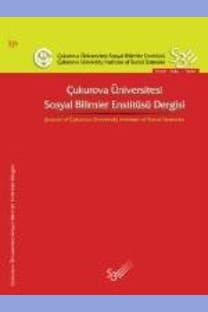İNGİLİZCEYİ YABANCI DİL OLARAK ÖĞRENEN ÖĞRENCİLERİN İSTENMEYEN DAVRANIŞLARINA YÖNELİK KULLANILAN YÖNTEMLER
Bu çalışmanın amacı İngilizce okutmanlarının, İngilizceyi yabancı dil olarak öğrenen yüksek öğrenim seviyesindeki öğrencilerin istenmeyen davranışlarıyla baş etmek için kullandıkları stratejileri tespit etmektir. Çalışma 2017-2018 akademik yılları arasında, bir üniversitenin hazırlık okulunda görev yapan 20 İngilizce öğretim görevlisinin katılımıyla gerçekleştirilmiştir. Bulgular, 10 adet açık uçlu sorudan oluşan bir anket ile toplanmıştır. Verinin değerlendirilmesinde içerik analiz tekniği kullanılmıştır. Çalışmanın sonucunda, İngilizceyi yabancı dil olarak öğrenen öğrencilerin istenmeyen davranışlarına yönelik kullanılan 12 adet stratejiye ulaşılmıştır. Öğretim görevlileri sözlü anlatım ile ya da yüz ifadelerini ve vücut dilini kullanarak öğrencilerini uyarmaktadır. Ayrıca, sessiz kalmak, soru sormak, istenmeyen davranışın nedenini araştırmak, istenmeyen davranış sergileyen öğrencilerin ihtiyaçlarını ortaya çıkarmak, farkındalıklarını arttırmak, teşvik etmek, yüz yüze konuşmak, dikkatlerini çekmek ve davranışı görmemezlikten gelmek istenmeyen davranışlarla baş etmek için kullanılan diğer stratejilerdir.
THE COPING STRATEGIES APPLIED TOWARDS THE UNDESIRABLE BEHAVIORS OF EFL LEARNERS
The purpose of this study is to find out the strategies that EFL instructors apply to cope with undesirablebehaviors of language learners at the tertiary level. The study was conducted with 20 EFL instructors workingin the preparatory school at a university in 2017-2018 academic years. The data was gathered through asurvey including 10 open-ended questions. Content analysis technique was used to assess the data. The resultsof the study reveal that EFL instructors apply 12 coping strategies towards the undesirable behaviors oflanguage learners at tertiary level. The instructors use body language, verbal and facial expressions to warntheir students. In addition, keeping silent, asking a question, finding out the reason of the undesirable behaviorand the needs of the disruptive students, raising awareness, increasing motivation, talking in person, attractingattention, and ignoring the undesirable behavior are the other coping strategies.
___
- Altıok, E. (2013, November 24). Sınıfta istenmeyen davranışlar. Retrieved from Prezi: https://prezi.com/mz0ij8t_mhrb/snfta-istenmeyen-davranslar/
- Güleç, S., & Alkış, S. (2004). Öğretmenlerin sınıf ortamında kullandıkları davranış değiştirme stratejileri. Uludağ Üniversitesi, Eğitim Fakültesi Dergisi, 17(2), 247-266.
- Key, J. P. (1997). Descriptive research. Oklahoma State University Retrieved from: https://www.okstate.edu
- Kuhlenschmidt, S. L., & Layne, L. E. (1999). Strategies for dealing with difficult behavior. New Directions for Teaching and Learning, 77
- Marciniak, A. (2015). Effective ways of dealing with discipline problems when teaching adolescent learners. World Scientific News, (7), 53-72
- Merç, A., & Subaşı, G. (2015). Classroom management problems and coping strategies of Turkish student EFL teachers. Turkish Online Journal of Qualitative Inquiry, 6(1)
- Özben, Ş. (2010). Teachers’ strategies to cope with student misbehavior. Science Direct, 2(2), 587-594
- Pala, A. (2005). Sınıfta istenmeyen öğrenci davranişlarini önlemeye dönük disiplin modelleri. Manas Journal of Social Studies, 13(7), 427
- Sadık, F., & Doğanay, A. (2007). Sınıf içi istenmeyen davranışlarla ilgili öğretmen, öğrenci ve veli görüşlerinin karşılaştırılması. Çukurova Üniversitesi Sosyal BilimlerEnstitüsü Dergisi, 16(1), 539-560
- Taylor, S. E., Pham L. B., Rivkin I. D., & Armor D. A. (1998) Mental Simulation, SelfRegulation, and Coping. American Psychologist, 53(4), 429 439
- Taylor, S. E., & Stanton, A. L. (2007). Coping resources, coping processes, and mental health. The Annual Review of Clinical Psychology, 3, 377–401
- Teyfur, M. (2015). Undesirable student behaviors encountered by primary school teachers and solution proposals. Academic Journals, 10(17), 2422-2432
- Yılmaz, S., & Şahinkaya, N. (2010). The relationship between the methods teachers use against the misbehaviour performed in the classroom and emphatic tendencies of teachers. Procedia Social and Behavioral Sciences, 2, 2932–2936
- ISSN: 1304-8880
- Yayın Aralığı: Yılda 2 Sayı
- Başlangıç: 2013
- Yayıncı: Çukurova Üniversitesi Sosyal Bilimler Enstitüsü Dergisi
Sayıdaki Diğer Makaleler
FUZZY ANALYTIC HIERARCHY PROCESS AND TOPSIS FOR PART-TIME STUDENT SELECTION
Mert DEMİRCİOĞLU, Erkan TİYEKLİ
“RESILIENCE” KAVRAMINA ÖRGÜT BAĞLAMINDA TÜRKÇE KARŞILIK ÖNERİLERİ
Merve GERÇEK, Dilek YILMAZ BÖREKÇİ
PROGRAMATİK REKLAMCILIK: KAVRAM, İŞLEYİŞ VE POTANSİYELİ AÇISINDAN DEĞERLENDİRMESİ
SOSYAL SERMAYENİN KURUMSAL, KAYNAK BAĞIMLILIĞI VE İŞLEM MALİYETİ KURAMLARI CEPHESİNDEN ALGILANIŞI
KÜRESEL ÖLÇEKTE ENERJİ SEKTÖRÜNÜN REKABET GÜCÜNÜN DEĞERLENDİRİLMESİ: MINT ÜLKELERİ ÖRNEĞİ
TECİL MÜESSESESİNİN 6183 SAYILI KANUNA HÂKİM OLAN İLKELER AÇISINDAN DEĞERLENDİRİLMESİ
Neslihan COŞKUN KARADAĞ, Fatih KARABUĞA
RESEARCH ON DETERMINING PERCEPTIONS AND ATTITUDES TOWARDS EMOJI USE IN DIGITAL MARKETING CAMPAIGNS
